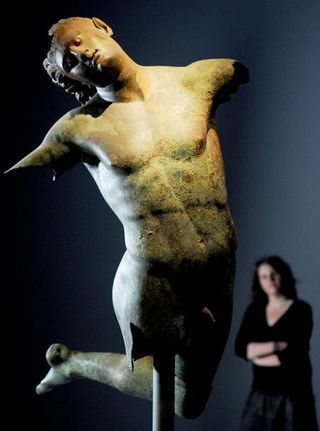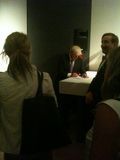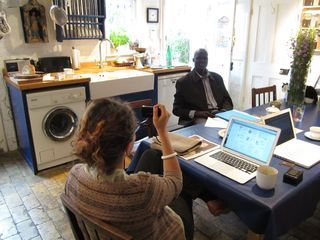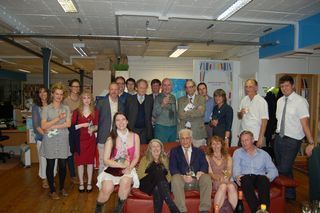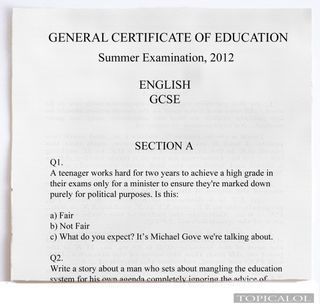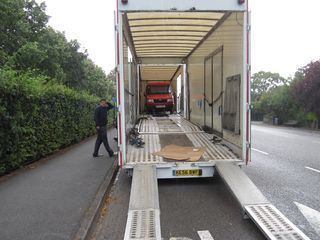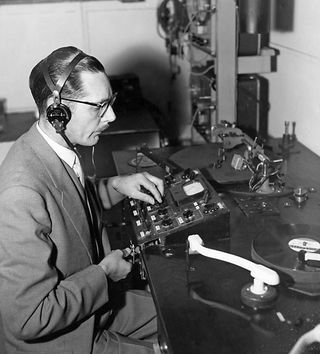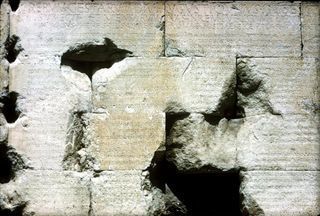Mary Beard's Blog, page 52
September 12, 2012
A gold for bronze
Last night we (that's me and the husband) went to the opening of the Bronze exhibition at the Royal Academy (rather bittersweet for the husband, as he had been involved in an exhibition of Syrian Art, which would have been opening there next year. . . well, you can guess what's happenedto that).
 Let's say to start with that it is really worth going, and it features wonderful stuff you'll never have seen, or not all together. One star of the show must be the extraordinary Greco-Roman dancing satyr (at the top of this post) rescued from the sea off Sicily, but then there is also the Crosby Garrett helmet and some pretty damn stunning modern stuff (a brilliant bit of Anish Kapoor, and the Louise Bourgeois spider (on the right).
Let's say to start with that it is really worth going, and it features wonderful stuff you'll never have seen, or not all together. One star of the show must be the extraordinary Greco-Roman dancing satyr (at the top of this post) rescued from the sea off Sicily, but then there is also the Crosby Garrett helmet and some pretty damn stunning modern stuff (a brilliant bit of Anish Kapoor, and the Louise Bourgeois spider (on the right).
It's gorgeous. But one of the points of the exhibition is to destabilize you, in time and space.
Most of the eminent art historians walking round the opening had one thing to say: isnt it amazing how you just cant date this stuff or even say where it comes from? That was certainly what I felt (and I'm not an eminent art historian!). I looked at one splendid pug dog and thought China.. in fact the damn thing was (if I remember rightly) Netherlandish. And then there was a spindly figure from Etruria, secomd century BC, that looked for all the world like a Giacometti -- in fact it might have been the kind of thing that Giacometti got the Giacometti idea from.
This means, for the ancient material, that the jury really is still out about their date. Take the dancing satyr. As I said, it was found off Sicily... but was it in a boat coming to Rome with stuff from Greece (in which case a fourth century BC date, even the great Praxiteles might be possible), or was it going from Rome to Vandal Africa, as the catalogue hints (in which case it might equally well be a bit of brilliant Roman imperial metal work).
And then it is very hard to tell Renaissance restorations (the technique is the same). The husband looked very suspiciously at the chimaera from Arezzo. Is that really all Etruscan? I was pretty gung-ho. But sure enough, when we look at the catalogue, there is a doubt about that tail. Is it a restoration? How would you know?
And then there's the big question about the relationship of bronze to marble sculpture. Alastair Sooke in the Telegraph talks about the bronze version of the Laocoon in this show as a gesture to the original bronze behind the famous marble in the Vatican. But can we so sure that there was a bronze original? It's all dead intriguing. It's just too easy to say that behind every great (surviving) ancient marble sculpture, there's an even great (lost) bronze original.
Anyway, the opening of the RA show was done by Boris Johnson, the man of the moment. He didn't seem like a future Prime Minister to me. It was a genial enough, studiedly unprepared, speech, but why score party political points at such an occasion (congestion charge lowered, Olympics brought in under
budget.. well, only under budget if you take the final vastly increased budget is the yardstick.. come on..!).? Why not just celebrate the show? (You can just about see him below putting the finishing touches to the speech, with the main curator on the right.)
Though the joke (already used on the Today programme) about "Bronze gettimg a Gold" was a nice one.
Hugely recommended as a show.
September 10, 2012
London Met University: immigration & the personal side.
There must be a hundred reasons why the government's move against London Metropolitan University is at best a sledge-hammer to crack a nut, at worst a misguided attack on GB's tradition of offering its educational expertise to the world.
But I found myself thinking, when all these visas were cancelled, what were the individual stories of sadness and disappointment that were involved. I thought that especially in this case, because a friend of the daughter (above) had just got a scholarship to come to London from South Sudan to do a Master's Course. Luckily at the University of Westminster, not at LMU.When I thought of what he had been through to get to be here, if he had had that suddenly snatched from him at the last minute . . . .
It's easy to think about foreign student's comng to the UK as the matter of just filling in an application form. In fact, for some, it can be a real marathon, stressful, labyrinthine, and a real outlay of cash (which you don't have) if it isn't actually successful.
In Samuel's case, he had to get his application off in hard copy to the UK from South Sudan. That itself took ingenuity and a bit of help from yours truly this end, just to get the documents onto the Uni of Westminster desk. Then after the good news that he had got the money, he had to get the whole thing confirmed and get a visa. Internet access for South Sudan is no piece of cake (his temporary access password had expired before he managed to get online), and there is no regular way of getting a UK visa in South Sudan. So he had to go to Nairobi to get the visa (I should say at this point that both the University of Westminster and the British Consular officials in Nairobi were absolutely brilliant in getting him here on time, but it was knife edge.)
The Uni of Westminster then (brilliantly) got him on a flight to the UK, and he is starting his induction week tomorrow. He has to get himself dug in here, open a bank account, report to the police (yes), work out how London transport works, and the supermarkets, and a million of other things.
When I hear people talk about these student visa applicants as if they were all potential terrorists, I think it is an insult to what Samuel has been through just to get here. So wish him luck.
September 6, 2012
All in a don's day?
This is, I fear, a piece of bloggish narcissism. But on Tuesday we
had a bit of a get together at Profile books for all those whose
comments had been published in the lastest volume of a don's blog. (If
you comment was included and you didnt get an invitation, please can I
say that we went to every trouble to get in touch). The husband was in
Greece, but the son and the daughter were there (on the door, and at
the bash); as was the brilliant Debbie, whom many of you know.
Anyway, that's a survivors' photo above (taken in Profile's offices). I suppose I ought to be offering prizes for the number of correct identifications anyone can make.. PL, SW Foska, Cerberus, A Dennis, and a couple of Stroppy's (Author and Liz).
But really, this is another chance to say to you all THANK YOU for making this blog what it is. In my speech (a rather aggrandizing description ???) I did say that I was so pleased that together we had made a blog in which we all contributed without that weirdly aggressive ranting that you find on plenty of websites (none of that "what a load of f****** tosh, what does this f***** woman know, who does she f********* think she is" -- more the wry dart, the poem and the Latin quote)
So onwards and upwards all; and thank you..... keep on commenting.
(And some sort of prize will go to any non-attendee who gets 90% of the above attenders right! Noms de blog will do)
September 3, 2012
What purpose are exams supposed to be fit for, Mr Gove?
I'm beginning to feel that we (... ok the media, and various other organs of public opinion) are beginning to get as fixated on exams as we are already are on prisons. Any time we find something else we dont like, we reach for a prison term to punish its perpetrators -- no matter how inappropriate.
Now with kids, almost all we seem to get really worked up about it how we examine them. It's not an exact parallel of course. It's easy enough to sound off about standards and how we ought to test and re-test the little buggers. But luckily an awful lot of people in the country have children, and watching what they go through tends to dampen the enthusiasm for wall to wall exams. None the less almost everyone can get worked up by grade boundaries now, modular systems and whatever. (Here's a bit of a background from Michael Gove himself from this morning's Today Programme; and here is the official data on what it takes to get an A* at A level.)
I have to say that I have some sympathy with Michael Gove's dislike of modules and course work (with a helping hand from the middle class mum and dad) and retakes at will. But I can also remember the kind of rhetoric (and it was by no means stupid) that brought to an end the whole idea of sudden death exams -- the idea that everything hung on what you did in 3 hours after several years work.
Anyone my age will remember this too. The argument went that a kid might have done brilliantly through the year then entirely cocked up the three hour exam (teenagers for God's sake). Was that fair? Of course it wasn't. There was also the worry that girls performed less well in such exams than boys. I don't know if that was true, but it was certainly one plausible reason for moving towards different methods of testing.
The odd thing is that most universities are still travelling in the opposite direction to Mr Gove. For all kinds of reasons (including gender, but also the question of what skills we think we want to test) we are moving away from the trad 3 hour exam, towards all kinds of methods of "alternative assessment" (dissertations, portfolio of essays, open book exams, etc etc).
I'm not sure that any of these methods of assessment are "fair". In fact the worst thing is probably to imagine that there really IS a fair method of testing that we just have to find or devise. There are pluses and minuses in every system, and we delude ourselves to think anything else. Maybe in fact a bit of a mixture evens things out.
But the big question is what we think we are setting these exams FOR. And that question is not looked at as often as it should be. It seems to me that we are trying to do far to much with a single set of exams (fair or not): we're trying to make sure that all kids leave school with a basic set of skills, we're trying to check up on whether schools are doing their job, and we're trying to establish a gateway for further education. I dont see how one system can do all those things "fairly".
I havent got an answer here. But I do know that the real test of an education system is not what the kids do in their school years (almost every teacher in the land can teach for the exam if they choose too, and we can all congratulate ourselves on rising standards); but it's what they are doing 10, 20, 30 years later. And it's much harder to track that.
One thing I am pretty sure about is that Michael Gove doesnt know the answer to this any more than any of us do. It's just that he is in a position to impose his own "bright" ideas.
August 30, 2012
The road from Rimini
I am afraid that this post may end up reading a bit like a commercial for AA European Breakdown cover. But just occasionally, when minor domestic disasters hit, you end up not feeling infuriated with every piece of adminsistration you come across (the hours of "your call is important to us", interruptinng hours of tapeloop Vivaldi) ... but in the hands of efficient people who actually get you sorted, and nicely too.
This story is, of course, about the van. When finally the lads had found a way of insuring the thing before the European road trip, I had a sudden rush of maternal responsibility and insisted to the son that he take out a month's AA breakdown cover for Europe. Never has £160 (if I remember right -- which was the cheap rate for him as AA member) been better spent. Because in fact the poor vehicle did in fact break down on the Italian side of the Brenner Pass (as I briefly mentioned a few posts ago). It was terminal problem with the clutch.

The first thing that happened was that the AA (contracting out I assume) got it to a local garage, for diagnosis. To be honest there was a bit of delay then, while feelers were put out on its mendability in Northern Italy. The prosecco swilling local garagista was convinced that there wasnt a hope in hell, but for obvious reasons the AA were quite keen on trying to find some local first aid.
The garagista, of course, proved right, and so repatriation of the corpse (from not far from Rimini to Cambridge was agreed). The lads flew on (rather than drove) to the next place on their trip (Berlin) -- with some financial assistance for extra expenditure promised -- while the van (and most of their stuff, sleeping bags etc inside it) waited its own transport. The deal was it was to get the Cambridge shortly after the planned date of their return.
Sure enough, the very next day, a guy rang to say he had the van and could deliver it the following morning. And so he turned up in a vast truck, which he had driven all the way from somewhere in south Italy with two dead British cars, picking up the guys' van in Rimini.
It turned out that he spent his life doing this, taking dead vehicles (or maybe occasionally living ones) between the UK and Italy, both ways. You'd have thought he would be fed up with the whole thing, and not particularly minded to do much more than the basics for yet more people with broken down cars. But far from it.
His truck was so vast that he could only park on the other side of the main road outside our house. And this meant that the van had to be got out onto the road and then pushed across the highway and manipulated into a small space in the lay-by.
The guy would have been quite within his rights I think, to have dumped the damn thing somewhere off the actual road and to have waved bye bye. But actually he got us all organised, pushing and steering .. and in just a few attempts the van was safely and conveniently positioned.
I feel embarrassed at the sequel. I asked him if he'd like a cup of tea or coffee, but he said he really  needed to get on. I then thought that maybe I should give him some cash, but I bottled out -- somehow, when you've just driven from Rimini, being slipped a £20 note could seem a bit of an insult. And I wasnt sure that he looked like a wine man ... and to hand him a copy of A Don's Life or something would have been a bit too self-regarding.
needed to get on. I then thought that maybe I should give him some cash, but I bottled out -- somehow, when you've just driven from Rimini, being slipped a £20 note could seem a bit of an insult. And I wasnt sure that he looked like a wine man ... and to hand him a copy of A Don's Life or something would have been a bit too self-regarding.
So we just let him go... back to Rimini I guess.
But thank you so much.
August 27, 2012
Can anyone help me find Leslie Smith of the BBC?
This is a cry for help (again!). I'm trying to write up some of the work I did on Moses Finley's journalism. In particular, I'm hoping to put my paper into the published conference proceedings. But the best idea would be to publish with it a couple of Finley's unpublished radio talks or discussions, preserved in the BBC archive, because they really do add something to the basic story.
This isn't so difficult to organise if it is a simple talk by Finley himself (and I've got my eye on one of those). Then you just have to get permission from Finley's literary executors (and I'm optimistic on that one). It's more complicated if anyone else speaks in the broadcast, even if only to ask the questions, because then you have to get their permission too, or that of their heirs. Or you can omit their contributions entirely from the published version, which rather spoils the conversational feel in an interview.
Anyway, I am wanting to reprint an interview with Finley from an early 1960s BBC radio series, called "Born Elsewhere". It was a series of interviews with Brits who had been, as the title implies, born outside the UK. It was part of what was no doubt a noble BBC initiative to help us start thinking about multi-culturalism, diversity etc. The trouble is that I need to get the permission of the interviewer, Leslie Smith -- or his living representatives.
It is hard to find much about Smith. It seems that his most famous interview was with Maharishi Mahesh Yogi in 1969, and he did a variety of interviews in the 50s and 60s (including a BBC programme abour radio and tv interviews in 1961: "Invitation to Speak"). The BBC archive knows that he once lived in Bexhill-on-Sea. But that is about it.
My resourceful assistant, who used to work for the BBC, has posted a query on the BBC ex-employees message-board, but no leads yet. Meanwhile we've been trawling Bexhill-on-Sea websites. This produced a Leslie Smith who was in St Vincent's care home in Bexhill in 2007, with a daughter called Lyn Edwards. But then Leslie Smith isn't that uncommon a name . . . so maybe there's no connection.
If anyone is reading this who remembers Leslie Smith of the BBC, or has any lead to his family, do let me know. I'd be so grateful.
August 24, 2012
University publicity
I am not a dinosaur. That is, I know that universities need press offices and officers, and indeed our own press officers have helped me out of several scrapes. The idea that a university could now exist without someone to help filter the calls about access/Higgs whatever/ancient sex is pretty unthinkable.
But how pro-active should the press office be? The husband pointed me to a trio of jobs at the Open University advertised in the paper earlier in the week, which makes the heart sink. (Let me say straightaway that I am sure that the OU is no worse than any uni... so I'm not getting at them in particular, but at the 'system' in general.)
Ok. After all the introductory stuff about what an exciting time it is to be at the OU.. the first job is a for a "reputation manager".. this is the brief:
"You will raise the profile of our academic excellence by developing
stories and replaying them across a wide range of channels and
audiences, including media and social media. You will need strong
communication and organisational skills to lead and coordinate
activities across the University and harness the support of our
ambassadors."
The next one is aimed at 'social media":
"We’re looking for a creative communications professional, who is
comfortable in the online and social media environment, to join our
Strategic Communications Programme (SCP) team to deliver a step change
in how we attract students and sponsors. SCP is an integrated Marketing
and Communications initiative to build our academic reputation and
harness our ambassadors and advocates. You will develop our reputation for thought leadership in areas of special interest to the University."
The other is focussed I guess at employers:
"We’re looking for a creative communications professional to join our
Strategic Communications Programme (SCP) team to deliver a step change
in how we attract students and sponsors. SCP is an integrated Marketing
and Communications initiative to build our academic reputation and
harness our ambassadors and advocates. You will engage employers with the benefits of sponsoring staff on OU qualifications, and students with the impact an OU qualification can have on their career."
You may wonder what these jobs actually involve doing... what would a day in the office actually involve? Not entirely clear, but the Further Particulars do add a few details.
Take the social media one. Here are some of the main duties:
• Working with Digital Engagement, contribute to a pan-university approach to social media activity.
• Work with the Senior Manager, Stakeholders and Ambassadors, on the development of our thought leadership event programme harnessing social media to increase our impact with this programme.
• Day-to-day quality control of all student and employer facing content in our primary Facebook, Twitter and LinkedIn presences.
• Work with academic staff to develop their social media profiles for impact on external audiences such as potential students and the media.
• Work with staff to optimize their text, audio, and video content and social media channels, evaluating existing content. Dependent on their abilities, this may include producing and editing digital content for them.
Well apart for some elements of the social media police being involved here, you may still not be much wiser. Try the reputation manager:
• Develop and implement a new Academic Excellence Communications Strategy for the University based on a focused approach aimed at maximum impact on key opinion formers and decision-makers.
• Develop and maintain knowledge of key areas of OU academic excellence and publicise and disseminate news and information accordingly to target audiences, liaising with the media relations team as appropriate for high impact stories.
• Network across faculties, institutes and relevant service units to maximise news gathering, dissemination and impact.
• Support the development and implementation of stakeholder engagement/communications for specific high impact projects and initiatives.
• Create presentations on academic excellence for the PVC (Academic) and other senior staff and provide briefings and guidance for presentation opportunities.
• Manage high profile events aimed to raise the profile of key academics
Or the employer engagement post:
• Commission and edit news stories for the bi-monthly staff enews and liaise with the Commercial Direction, Head of Careers and PVC (Academic) to ensure that individual achievement is acknowledged with personal thanks and the best examples promoted to the Vice Chancellor for celebrating in his video addresses.
(So we learn that the VC of the OU makes "video addresses")
At this point I get to feel dead old fashioned. I really want basic uni research to get widely disseminated. But is this the way to do it? This reeks to me of another UK university which actually flew out journalists to report on its excavation in Italy, and (of course) got loads of publicity... is this the most interesting excavation in the world. NO! Do they have the most efficient pr team? yes.
And just think ofthe cost. In the OU's case, they are appointing three people for two years, on a scale of £37-42k. You have to double that, at least, for all pension contributions, overheads etc. That means we're talking more than half a million on this enterprise. Cant help think how much frontline research might have been paid for with that.
August 19, 2012
India, the Olympic Games and "poor sports"
I didn't confess that we had a long weekend in New Delhi last weekend. (I'd happily tell 99.99% of readers and commenters, but "social media warnings" now make it very clear that announcing that your whole family is away on your blog is a bit like leaving a note for the burglars on the front door, saying "key under mat".)
The husband was partly on the search for the architecture of W. S. George (who worked in Greece and India), and I went along for the ride. The truth was, in the midst of Olympic fever, that it proved interesting to see what the Olympics looked like from the point of view of a nation that hadn't just won 65 medals.
India had got 6 medals (doubling their total of 3 in Beijing) -- and that included the woman boxer Mary Kom (who was trumped by our Nicola), and Sushil Kumar (above) who got a silver medal in the wrestling.
There were some striking differences (and wry similarities) in what the Indian papers were saying about their athletes' achievements, compared with ours. For a start, class and wealth were pretty near to top of the agenda. There was a bit of breast-beating about how Indian hockey was in free-fall . . .but the main question was -- what should a country like India do? Well, said one Indian ex-Olympian in the Times of India, invest in "poor sports". "No rich family boy will go into sports like weightlifting, boxing or wrestling. These are clearly poor man's sports." That's where India could hope for medals in the future (not dressage or canoing, in other words).
And it was pretty clear that there wasn't much of a training regime, funded by lottery or sponsors, like our athletes have. May Kom seems to be something of a real professional. But, so far as I could see a lot of the others really were people with fulltime jobs, training in their spare time . . . a kind of unequal competition with the USA, China or UK (sorry "Team GB").
In fact Sushil Kumar's father said that Sushil (who was widely reported as having denied biting his opponent's ear on the grounds that he was vegetarian, so wouldn't have!) didn't even have a training partner, so how could you expect him to get a gold medal? But he then went on to complain that he wouldn't see anything of his son when he got home, because he would be whisked off to see the President and Prime Minister, before he had a chance to see his family.
But this was a rare piece of grumpiness. For the most part, there was a cheeriness that such a notoriously and self-confessedly un-sporty nation had done as well as it had (and some hope of double figures next time).
And there was a nice sense of commonwealth internationalism too. One little feature in the Times of India asked which head of state had presided over the greatest number of gold medals? Was it Obama with his 46 USA golds? No it wasn't. It was, of course, Queen Elizabeth, with 49 golds from Team GB, Australia, New Zealand, Jamaica etc etc.
Anyway I'm now hoping for a great Indian medal haul in Rio in the proudly "poor sports".
**************
If any of you wondered what happened to the post office van that the son was taking round Europe -- it got a terminal condition of the clutch somewhere near the Brenner Pass, and is being ambulanced back to Cambridge.
August 14, 2012
Modern tax farming: and the Roman dangers of private enterprise
In an hour or so we shall hear which bid has been accepted to run the West Coast Mainline railway route: First Group's or Virgin's (and by the time you read this, you'll probably already know). And the news broadcasts are full of dire warnings about how the government should decide. It's not just a question of accepting the highest bid to run the service. If a company bids too high for the contract then, they find it much harder to make a profit -- so they start cutting services and the public get cross (= political votes lost), or worse, they have to renege before the contract is finished (=more egg on face, and more votes lost).
I'm surprised that no-one has mentioned the ancient Roman precedent here. Because they had just these problems and their form of private enterprise gone mad was one of the factors that led to the end of Roman republican democracy and ultimately the rise of autocracy.
The jewel in the crown of Roman private enterprise was tax farming. When the republican Romans wanted to (say) impose taxes on a province, they didn't collect the taxes through state officials, but by offering the tax contract to rival bidding companies -- of "tax-farmers" or publicani (the 'publicans' of the King James Bible).
It was a simple principle. The companies offered their bids, waving the figure they would hand over to the Roman treasury for the taxes of the province, and anything else they made in the process of collection was their profit. The higher they bid, the more they had to squeeze cash out of the poor bloody provincials to make any money for themselves (and that meant intimidation, violence, extortion etc ... which wasnt exactly a vote-loser in the ancient Roman province, but was a bundle of trouble for the Roman administration). If they really bid too high, they could come off with a loss.
That is what happened in the late 60s BC, when a tax-farming company had bid much too high for the tax-farming contracts of the province of Asia (which covered a large part of modern Turkey) and wanted to renegotiate. They were backed by one of the biggest Roman plutocrats, Marcus Licinius Crassus.
To support this cause, in 60 Crassus entered an electoral pact (a coalition?) with Pompey the Great and Julius Caesar: they would stick together to get Crassus's friends' tax contract revised, to get Caesar elected to the consulship and to get land found for Pompey's veteran soldiers. It is a political deal now often known as the "First Triumvirate" -- an entirely informal arrangement, but in their confidence that they could gang up privately to rig the Roman political process, it was a harbinger of the dictatorship just around the corner (as some Romans saw).
I had been hoping that the G4S Olympic debacle might be enough to end our love-affair with private contracting. But if we need it, we should always wave the example of the Roman tax-farming precedent.
By the way... ironically (given the powerful indirect role it played in the rise of Roman autocracy), the first emperor Augustus phased the dreadful system out.
August 13, 2012
A nice new fragment of Augustus' Res Gestae -- so there!
OK, this is a niche blog post. But it's what I've got curious about just now, and it's a nice example of the little ways in which the story of the classical world gets changed -- so let's share it.
One of the most extraordinary documents to survive from the ancient world is the "autobiography" of the first emperor Augustus (text here). This was originally written by (or for) the emperor himself, and inscribed on bronze pillars in front of his tomb after his death.
Those don't survive, but in the nineteenth century a largely complete bi-lingual copy, in Latin and Greek, was discovered in the Temple of "Augustus and Rome" in Ankara (above), also inscribed post mortem. This has become one of the most important documents in the whole of ancient history, and not surprisingly. It's a first person account by a Roman emperor, but not just any emperor --but by the young thug who slaughtered his enemies (Octavian), then re-invented himself as founding father (Augustus) of a paternalistic autocracy. (Mussolini had the whole Latin text inscribed on retaining wall of his reconstructed Ara Pacis, just next to the emperor's Mausoleum -- preserved in the new reconstruction.)
I teach the Res Gestae a lot.. in fact it's a "set text" for the students on our 4 year course who come to Cambridge to do Latin and Greek from scratch (the Latin of the RG is quite easy).
And now there is a new fragment of this amazing document, which takes away some of the things I've usually said about it.
The point is that fragments of other inscribed copies of the RG survive: one from Antioch (not the town in Syria) and one from Apollonia. And the puzzle is that, putting Ankara together with these two, ALL the publicly inscribed copies of the text seemed to come from the province of Galatia (in modern Turkey).
And here has started a lot of talks with the students. Is this chance? Or is it showing different patterns in the dissemination of information in the Roman world (that is, was the governor of Galatia particularly keen on this kind of display of the dead emperor's achievements?.. or was the "Augustan" status of Galatia something to do with it? ).
Well a new article by Peter Thonemann in Historia 2012 puts the kibosh on that. Because he has realised that a tiny and otherwise insignificant fragment of Greek text published in 1932 in a volume of the inscriptions of the town of Sardis (Buckler and Robinson, 1932) was actually (as Buckler in an unpublished letter had already suspected) a small fragment of the Res Gestae. And Sardis is not in the province of Galatia, but in the province of Asia.
So the Galatian particularity no longer stands.And it makes you wonder exactly how widely through the empire the Res Gestae were originally disseminated.
So there's a new bit of stuff for me -- and the students -- to get their/our teeth into.
On such little fragments big ideas can be built...or may be.
Mary Beard's Blog
- Mary Beard's profile
- 4112 followers


